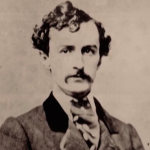“The Aftermath of the Lincoln Assassination,” Video, History Channel © 2018, A&E Television Networks, LLC.
Narrator: April 15th, 1865. Less than twenty-four hours after President Abraham Lincoln was shot and killed in Washington, D.C. Paranoia and rage gripped the nation. Retaliation against those who support John Wilkes Booth, the assassin, is swift and deadly.
Terry Alford: The manhunt that went in to operation for Booth was massive. It was unprecedented in American history. Everyone--public, private detectives, city detectives from New York, Federal Marshals, Provost Marshals, the home guard--I mean anyone that could be put on the chase was put on it.
Betty Ownsbey: At this time, the whole United States is in its most fragile state. The whole country is about to just break apart. No one has ever experienced such a calamity in this country before as the assassination of a president.
Michael Kauffman: People were attacked because they looked like Booth. People were attacked because they had expressed sympathy with Booth. People were actually strung up and killed.
Narrator: The situation is dire for anyone associated with the play “Our American Cousin” at Ford’s Theater. John Ford closes his theater. It never reopens.
Ownsbey: Harry Hawk, the actor who happened to be on stage at the time was so frightened after the assassination, he locked himself away and wouldn't come out for days. People were absolutely terrified.
Narrator: The government issues a huge reward that grows to one hundred thousand dollars, an unheard of sum at the time. It is equivalent to more than one million dollars today.
Alford: I mean everyone said they see Booth. In a way it had an unseamly element, almost of a gold rush. But also at the same time, a very determined effort to avenge Lincoln’s death.
Doris Kearns Goodwin: Many southerners realized later that had Lincoln lived, his leniency toward the South would have left them in such better shape than it eventually turned out to be. The irony is that the South lost its best friend when it lost Lincoln.
The Aftermath of the Lincoln Assassination
The month of April in 1865 is one of the most extraordinary in U.S. history. Watch this video which recounts the tumult and upheaval the nation experienced following the assassination of President Lincoln.
